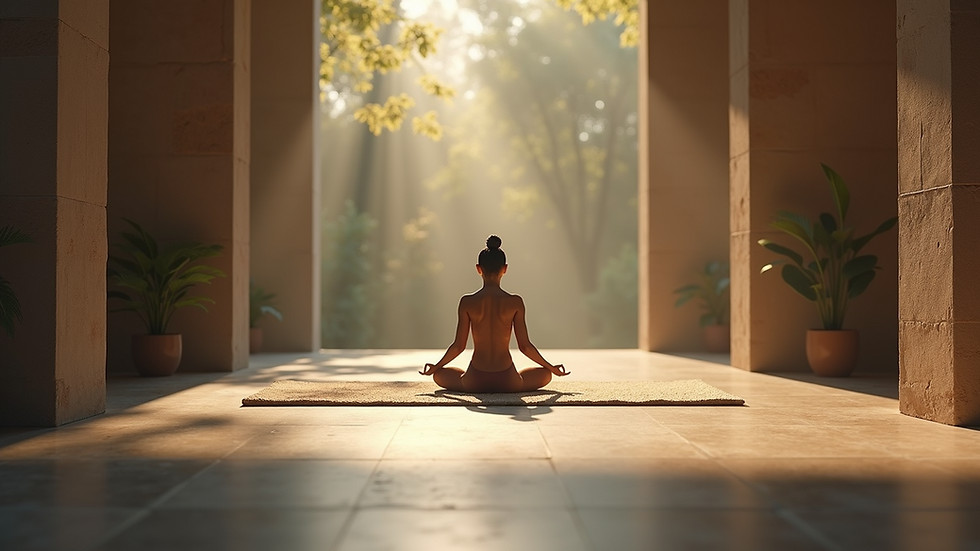How a Minimalist Approach Can Improve Your Well-Being
- Kendra Horne
- May 8, 2025
- 4 min read
Updated: Jun 22, 2025
The minimalist approach has gained significant attention in recent years for its potential to enhance well-being. Embracing minimalism isn't purely about owning fewer items; it's about fostering a clearer mindset and simplifying various aspects of life. In this blog post, we will explore how adopting a minimalist mindset can lead to improved mental health, increased happiness, and a clearer path toward personal fulfillment.
Understanding the Minimalist Approach
At its core, minimalism encourages individuals to evaluate their possessions, commitments, and even relationships. By prioritizing what truly matters, it helps reduce distraction and overwhelm. The modern world bombards us with choices and responsibilities, leaving many feeling anxious and stressed. A minimalist approach can act as a remedy by encouraging a focus on essential aspects of life.
Many people today live cluttered lives, literally and figuratively. Studies show that clutter can negatively impact mental health, leading to stress, anxiety, and even depression. According to a study published in the Journal of Environmental Psychology, individuals with less cluttered homes report feeling more energetic and positive. Thus, minimizing physical possessions is just one part of the bigger picture.
Reducing Clutter for Better Mental Health
One of the first steps to embracing minimalism is to declutter your living space. Start by identifying objects that no longer serve a purpose or bring joy. This process can be both liberating and empowering. Remove items that don’t add value to your life, and you may find an improvement in your overall mood and focus.

Studies suggest that a neat and organized environment enhances concentration and productivity. A clutter-free space allows for clearer thinking, making it easier to engage in creative or challenging tasks. For instance, a person who clears out their workspace is likely to approach their work with renewed vigor and enthusiasm.
Additionally, consider practicing digital decluttering. Our online environments are just as cluttered as our physical spaces. Unsubscribe from emails you don’t read, delete unnecessary files, and minimize social media distractions. This digital decluttering can lead to a significant reduction in stress and anxiety levels.
The Impact of a Minimalist Lifestyle on Happiness
Adopting a minimalist lifestyle can transform your relationship with happiness. Often, people believe that acquiring more things will lead to increased satisfaction. However, studies indicate that experiences, not possessions, are what truly bring joy. A minimalist mindset encourages individuals to invest in experiences rather than material items.
For instance, instead of purchasing a new gadget, consider planning a weekend getaway or engaging in a new hobby. Research by the National Institute of Health (NIH) shows that experiences promote lasting happiness much more effectively than material possessions. When we cherish memories and relationships, our happiness tends to grow.

Creating a list of experiences you'd like to have can be an excellent way to live more minimally. Instead of focusing on what to buy next, redirect your energy towards planning activities that enrich your life. This shift in focus not only improves your well-being but can also help strengthen relationships with friends and family.
Simplifying Commitments and Relationships
Minimalism extends beyond physical possessions; it also encompasses time and relationships. Many individuals overcommit themselves, leading to burnout and dissatisfaction. Evaluate your commitments and let go of those that do not align with your core values.
Start by saying "no" more often, especially to activities or obligations that drain your energy. Prioritize engagements that bring joy and fulfillment. This practice can lead to better mental health and help you focus on what matters most. According to a study from the University of Pennsylvania, reducing commitments can significantly lower stress levels.

In relation to relationships, it's beneficial to surround yourself with supportive and positive individuals. Minimalism encourages you to evaluate your friendships and invest your energy in connections that uplift you. This focus can lead to deeper, more meaningful relationships, enhancing your overall well-being.
Achieving a Sense of Control
Adopting a minimalist approach can create a profound sense of control over your life. The act of decluttering—both your physical space and your time—empowers you to make conscious choices about what to keep in your life. This control is vital for mental well-being.
Take time to establish routines that align with a minimalist mindset. Create daily rituals that help you maintain focus and balance. Whether it’s a morning yoga session or a nightly reading ritual, these practices can help enhance your sense of stability. A survey conducted by Psychology Today found that people with structured routines experience lower levels of stress.

Small, consistent actions can lead to enormous benefits over time. Regularly assess your routines to ensure they reflect your values and priorities. The more in control you feel, the more capable you become of navigating life's challenges.
Moving Forward with Minimalism for Better Well-Being
Incorporating minimalism into your life is not a one-time task; it’s an ongoing journey. Regularly evaluate your possessions, commitments, and relationships. Embrace the benefits of simplicity as a guiding principle in life. By cultivating a minimalist approach, you open the door to a more fulfilling existence.
If you’re intrigued by the idea of minimalism, consider exploring resources and communities focused on this lifestyle. Engage with people who share similar values and can offer support along the way. In conclusion, adopting a minimalist approach can lead to improved mental health, enhanced happiness, and a more meaningful life overall. By making intentional choices about what you keep and what you let go of, you can create a life that nourishes your well-being.




Comments